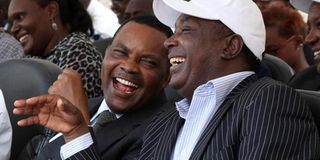How MPs plan to save CDF from chop

Constituency Development Fund board chairman Elias Mbau (right), with Masinga MP Benson Mbai during a Nyeri meeting on the fund’s future on June 25, 2015. PHOTO | JOSEPH KANYI |
What you need to know:
- High Court had ruled that CDF is unconstitutional but there are calls to retain it.
- One of the strengths of the CDF is that it allows the public to identify priority projects.
Members of Parliament and the Constituency Development Fund Board are racing against time to comply with the February High Court decree that the kitty was at variance with the Constitution.
The Sunday Nation has established that the plan is to submit a Bill repealing the law on the fund by August to give the National Assembly ample time to debate and pass it. They, however, have up to February 2016 to meet the 12 months deadline imposed by the courts.
The Board is currently at the Enashipai Resort and Spa in Naivasha to present the draft Bill to the fund committee chaired by Eldama Ravine MP Moses Lessonnet.
Unlike other Bills that would ordinarily be divisive, no opposition is expected on the law since MPs are an interested party with findings from the grassroots also pointing to immense public support for the kitty.
The Institute for Social Accountability and Centre for Enhancing Democracy and Good Governance had filed a petition challenging the constitutionality of the CDF Amendment Act, 2013, arguing it did not conform to the 2010 Constitution that ushered in the county governments.
The court thereafter ruled that the purpose and design of the CDF Act is constitutionally flawed in a number of aspects such as running parallel to the constitutionally recognised governance structures, the national and county levels of governments.
The fact that the Senate’s input was not sought in crafting it was another ground on which it was thrown out of the window.
COUNTRYWIDE TOURS
The draft Bill, seen by the Sunday Nation has been informed by findings of countrywide tours which among other things, indicate that members of the public want the amount increased from the current 2.5 per cent of the National revenue to at least 5 per cent.
“The Bill introduces Section 3 of the Principal Act, which will now set out the objectives/functions of the Fund, which functions shall be: to supplement infrastructure development at the constituency level in matters falling within the functions of the national government at that level as provided for under Schedule IV, Part 1 of the Constitution,” it reads.
The proposal in now such that the money sent to constituencies will come from what the national government retains after giving county governments their share.
The Bill introduces the establishment of the fund as consisting moneys allocated from the national government share of the national revenue, after division of revenue.
It also redefines the role of MPs in running the Constituency Development Fund Committees to comply with the separation of powers as provided for in the Constitution.
The MPs shall play oversight role only-having no say on allocation or deciding on projects.
One key strength of the CDF is giving the public to decide priority projects.
“The fund has facilitated the putting up of new water, health and education facilities in all parts of the country, including remote areas that were usually overlooked during funds allocation in national budgets, thereby improving the livelihoods and social wellbeing of constituents,” the report states.
It also turns out that the bulk of approximately Sh137 billion sent to constituencies since its inception has gone to education.
“The impact of these projects has been felt especially in education which takes approximately 55 per cent of pie in bursaries and development, health at around six per cent and water 11 per cent.”
“CDF is a unique model of advancing public goods to where they are needed the most, the bottom-up decision making regime makes it work for the people,” board chairman Elias Mbau told Sunday Nation in an interview.
UPSURGE IN HARAMBEES
Proponents of the kitty argue that as opposed to the county or national government where decisions touching on people’s lives are determined by policy documents authored in high offices, here they decide how the monies are spent.
“If the devolved structure is reorganised in such a way that it offers all the functions the CDF is doing now, who are we to resist? If not, we will still have a kitty modelled along this concept to fill in the gap,” said acting chief executive Yusuf Mbuno.
The board warns that scrapping of the fund would see an upsurge in harambees in the country.
“Before its introduction in 2003, you will recall that leaders were always bombarded with requests of harambees every now and then, something that fuelled theft in the public service. This will likely return were the fund to be scrapped without addressing development needs of the communities,” Mr Mbuno states.
Mr Mbau recommends that like the Constitution gives equalisation fund 20 years, CDF also needs some 15 years within which counties should organise themselves to render those services being offered by it.
Like directed by the courts, the Bill seeks to address the conflict of interest in the kitty’s administration.
While the Chief Executive Officers will remain as members of the Board, they shall have no voting right as per the code of governance for State Corporations.





